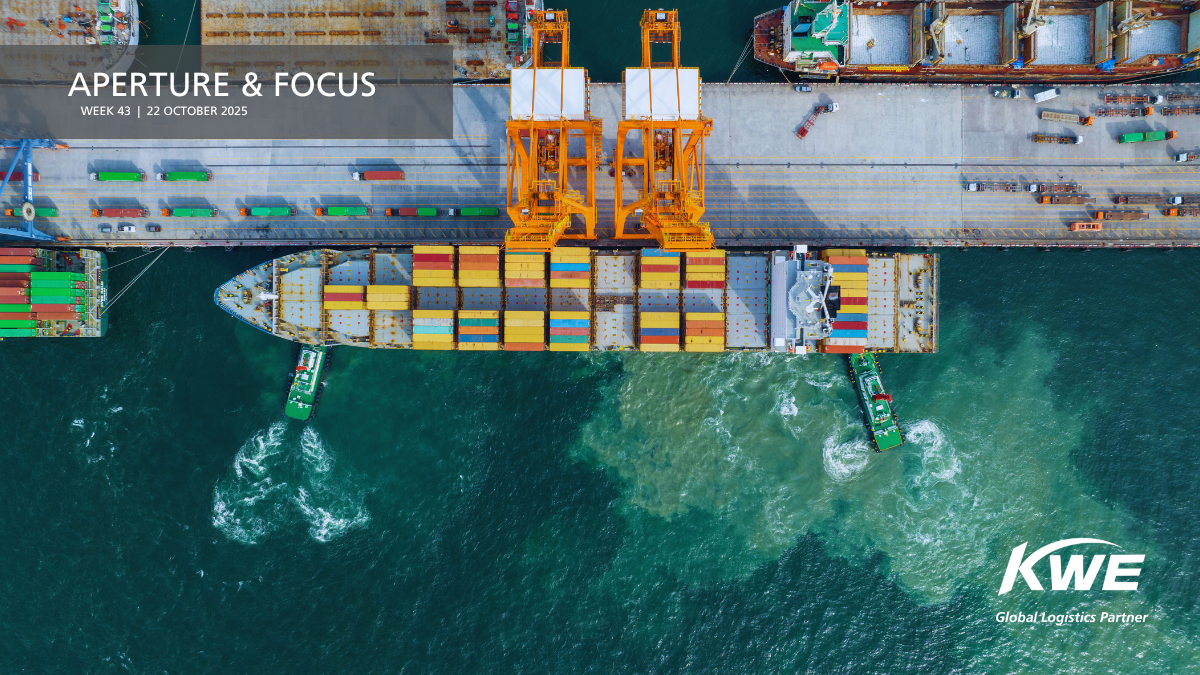Quote
Aperture & Focus 2025: Week 43

Global Aperture
The International Maritime Organization (IMO) postponed a vote on adopting a global carbon pricing system for ships on October 17th after the United States opposed the plan and threatened sanctions against supporting countries on October 10th. The delay, approved by a 57–49 vote in London, stalls implementation of the Net Zero Framework aimed at reducing maritime emissions from 2028, leaving the shipping industry without clear guidance on future decarbonization measures.
The International Air Transport Association (IATA) launched the Integrated Sustainability Program (ISP) on October 20th, a new certification framework that helps airlines manage and assess sustainability across environmental, social, and governance areas. Built on the IATA Environmental Assessment (IEnvA), the program includes four modules: environmental management, sustainable procurement, social responsibility, and sustainability performance.
Regional Focus
Americas
United States: The Federal Aviation Administration (FAA) reported flight delays at Houston’s George Bush Intercontinental (IAH) and Newark Liberty International (EWR) airports, on October 21st due to air traffic controller absences during the ongoing U.S. government shutdown. With more than 160 flights delayed in Houston and 170 in Newark, the staffing shortages disrupted passenger and cargo flight schedules.
Mexico: Exports surged 1.8% in the first half of 2025 as manufacturers rushed shipments ahead of potential new U.S. tariffs, according to the Federal Reserve Bank of Dallas. However, with U.S.–Mexico–Canada Agreement (USMCA) renegotiations underway and effective tariff rates rising from 1.6% to 10.6%, economists expect growth to slow to 0.7% in the second half of the year.
Asia-Pacific
Officials in the Hainan Province of China suspended operations at Xinhai Port, Xiuying Port, and the railway south port on October 20th as Typhoon Fengshen intensified in the South China Sea. On October 23rd, the storm made landfall on the central coast of Vietnam and brought heavy rainfall to the Hainan province, Philippines, and Laos.
Bangladesh: A fire broke out on October 18th at the air cargo complex of Hazrat Shahjalal International Airport (DAC) in Dhaka, disrupting operations before flights resumed later that day. The incident is expected to cause losses exceeding $1 billion to Bangladesh’s import and export sectors, with damage including destroyed goods, shipment delays, raw material shortages, and canceled orders affecting hundreds of garment and manufacturing exporters.
Europe, Middle East & Africa
Europe: Road freight throughout Europe is showing a cautious recovery this month after more than a year of weak demand linked to inflation, energy costs, and reduced consumer spending across major EU economies. Manufacturing-related shipments are beginning to rebound, but retail traffic remains soft as households curb discretionary purchases. A persistent driver shortage—estimated at over 420,000 vacancies—continues to constrain capacity, leading to uneven service levels across regions even as forwarders report higher spot-freight activity and stable contract volumes.
Germany: Munich Airport (MUC) handled a record 182,000 U.S. tons of air cargo over the past six months, a 10% year over year increase that surpassed pre-pandemic levels. Passenger and flight volumes also rose 5%, driven by strong intercontinental demand. While overall activity has remained robust, the airport briefly suspended operations on October 18th following reports of drone activity before reopening later that evening.
Belgium: Liege Airport (LGG)’s cargo volumes rose 23% year over year in the third quarter to approximately 369,000 U.S. tons (334,956 tonnes), supported by strong e-commerce imports and robust European exports. Aircraft movements increased 9% to 7,262, bringing total volumes for the first nine months of 2025 to about 1.06 million U.S. tons (961,640 tonnes), up 14.4% from the previous year.